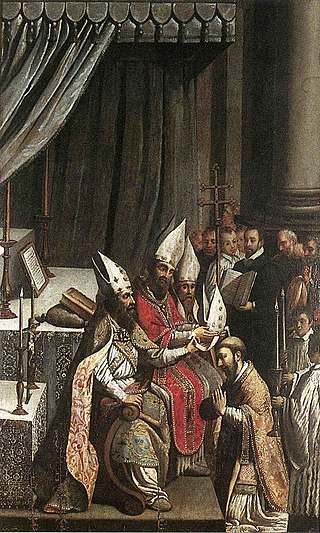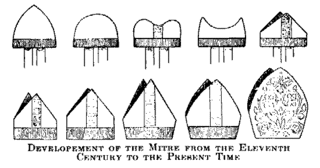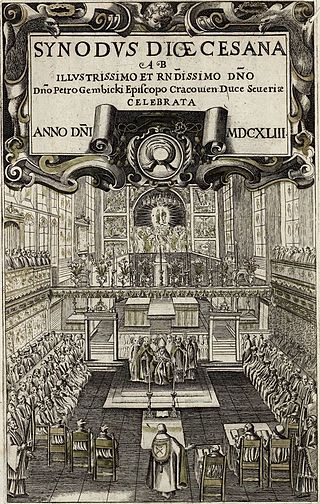
Apostolic succession is the method whereby the ministry of the Christian Church is considered by some Christian denominations to be derived from the apostles by a continuous succession, which has usually been associated with a claim that the succession is through a series of bishops. Those of the Anglican, Church of the East, Eastern Orthodox, Hussite, Moravian, Old Catholic, Oriental Orthodox, Catholic and Scandinavian Lutheran traditions maintain that "a bishop cannot have regular or valid orders unless he has been consecrated in this apostolic succession". These traditions do not always consider the episcopal consecrations of all of the other traditions as valid.
A bishop is an ordained member of the clergy who is entrusted with a position of authority and oversight in a religious institution.

An episcopal polity is a hierarchical form of church governance in which the chief local authorities are called bishops. It is the structure used by many of the major Christian Churches and denominations, such as the Catholic, Eastern Orthodox, Oriental Orthodox, Church of the East, Anglican, Lutheran and Methodist churches or denominations, and other churches founded independently from these lineages.

The Presbyterian Church (USA), abbreviated PC (USA), is a mainline Protestant denomination in the United States. It is the largest Presbyterian denomination in the country. The Presbyterian Church (USA) was established with the 1983 merger of the Presbyterian Church in the United States, whose churches were located in the Southern and border states, with the United Presbyterian Church in the United States of America, whose congregations could be found in every state.

In church governance, a diocese or bishopric is the ecclesiastical district under the jurisdiction of a bishop.
Presbyterianpolity is a method of church governance typified by the rule of assemblies of presbyters, or elders. Each local church is governed by a body of elected elders usually called the session or consistory, though other terms, such as church board, may apply. Groups of local churches are governed by a higher assembly of elders known as the presbytery or classis; presbyteries can be grouped into a synod, and presbyteries and synods nationwide often join together in a general assembly. Responsibility for conduct of church services is reserved to an ordained minister or pastor known as a teaching elder, or a minister of the word and sacrament.

A synod is a council of a Christian denomination, usually convened to decide an issue of doctrine, administration or application. The word synod comes from the Ancient Greek σύνοδος 'assembly, meeting'; the term is analogous with the Latin word concilium'council'. Originally, synods were meetings of bishops, and the word is still used in that sense in Catholicism, Oriental Orthodoxy and Eastern Orthodoxy. In modern usage, the word often refers to the governing body of a particular church, whether its members are meeting or not. It is also sometimes used to refer to a church that is governed by a synod.
The Confessing Movement is a largely lay-led theologically conservative Christian movement that opposes the influence of theological liberalism and theological progressivism currently within several mainline Protestant denominations and seeks to return them to its view of orthodox doctrine, or form a new denomination and disfellowship (excommunicate) them if the situation becomes untenable. Those who eventually deem dealing with theological liberalism and theological progressivism within their churches and denominations as not being tenable anymore would later join or start Confessional Churches and/or Evangelical Churches that continue with the traditions of their respective denominations and maintaining orthodox doctrine while being ecclesiastically separate from the Mainline Protestant denominations.

A united church, also called a uniting church, is a denomination formed from the merger or other form of church union of two or more different Protestant Christian denominations, a number of which come from separate and distinct denominational orientations or traditions. Multi-denominationalism, or a multi-denominational church or organization, is a congregation or organization that is affiliated with two or more Christian denominations, whether they be part of the same tradition or from separate and distinct traditions.
The Revised Common Lectionary (RCL) is a lectionary of readings or pericopes from the Bible for use in Christian worship, making provision for the liturgical year with its pattern of observances of festivals and seasons. It was preceded by the Common Lectionary, assembled in 1983, itself preceded by the COCU Lectionary, published in 1974 by the Consultation on Church Union (COCU). This lectionary was derived from various Protestant lectionaries in current use, which in turn were based on the 1969 Ordo Lectionum Missae, a three-year lectionary produced by the Roman Catholic Church following the reforms of the Second Vatican Council.

The Christian Conference of Asia is a regional ecumenical organisation representing 15 National Councils and over 100 denominations (churches) in New Zealand, Australia, Bangladesh, Burma, Cambodia, East Timor, Hong Kong, India, Indonesia, Laos, Japan, Korea, Malaysia, Pakistan, Philippines, Sri Lanka, Taiwan and Thailand.

The Huria Kristen Batak Protestan is a Lutheran church among the Batak people, generally the Toba Batak in Indonesia. It uses the Dutch Reformed style of worship due to the Dutch colonial heritage at the time it was founded. With a membership of 4,133,000, it is one of the largest Protestant churches in Indonesia and Southeast Asia. Its present leader is Ephorus (bishop) Robinson Butarbutar.
The Federal Council of Churches, officially the Federal Council of Churches of Christ in America, was an ecumenical association of Christian denominations in the United States in the early twentieth century. It represented the Anglican, Baptist, Eastern Orthodox, Lutheran, Methodist, Moravian, Oriental Orthodox, Polish National Catholic, Presbyterian, and Reformed traditions of Christianity. It merged with other ecumenical bodies in 1950 to form the present day National Council of Churches.
Ecclesiastical polity is the operational and governance structure of a church or of a Christian denomination. It also denotes the ministerial structure of a church and the authority relationships between churches. Polity relates closely to ecclesiology, the study of doctrine and theology relating to church organization.

Lutheranism is present on all inhabited continents with an estimated 80 million adherents, out of which 74.2 million are affiliated with the Lutheran World Federation. A major movement that first began the Reformation, it constitutes one of the largest Protestant branches claiming around 80 million out of 920 million Protestants. The Lutheran World Federation brings together the vast majority of Lutherans. Apart from it, there are also other organisations such as the International Lutheran Council and the Confessional Evangelical Lutheran Conference, as well as multiple independent Lutheran denominations.

The General Synod of the Anglican Church of Canada is the chief governing and legislative body of the Anglican Church of Canada (ACC), the sole Canadian representative of the Anglican Communion. The first General Synod session was held in Toronto in 1893, with the proviso that the parameters of its authority would not undermine the local independence of dioceses.
The ordination of lesbian, gay, bisexual and/or transgender (LGBT) clergy who are open about their sexuality or gender identity; are sexually active if lesbian, gay, or bisexual; or are in committed same-sex relationships is a debated practice within some contemporary Christian denominations.

In Christianity, the ordination of women has been taking place in an increasing number of Protestant and Old Catholic churches, starting in the 20th century. Since ancient times, certain churches of the Orthodox tradition, such as the Coptic Orthodox Church, have raised women to the office of deaconess. While ordination of women has been approved in many denominations, it is still a very controversial and divisive topic.